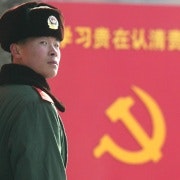Taiwanese voters' challenge to Beijing
Taiwanese voters over the weekend delivered a thumping defeat to the ruling Nationalist Party, or Kuomintang (KMT), with sweeping victories for candidates from the pro-independence Democratic Progressive Party (DPP) and independent candidates in municipal elections across the island, including in the key cities of Taipei and Taichung, traditionally KMT strongholds.
Seen from Hong Kong, the narrative of the Taiwan elections is clear: Taiwanese voters, spooked by the bleak prospects for democracy in Hong Kong and the violence employed against Hong Kong's pro-democracy protesters, punished President Ma Ying-jeou and his Nationalist Party for their China-friendly policies. It is a narrative that has been widely reported in the international media, and has been reported alongside quotes from Chinese state-controlled media to support the conclusion that Beijing is concerned at the outcome.
However to view the Taiwanese election as primarily a result of the "China factor" would be a mistake. While Taiwanese voters were keenly aware of Hong Kong protests, and certainly see the fate of Hong Kong as an indication of what Taiwan would face if they signed up to unification with China under the "One Country, Two Systems" model, these issues did not have much direct bearing on how they actually cast their votes.
Speaking to Taiwanese voters in the days since the elections, it is clear that the Taiwan elections were decided by the same factors that decide elections in democracies the world over: local issues and personality. Taiwanese voters were primarily concerned with local issues such as the economy, unemployment, inflation, stagnant wages and property prices, and they dislike President Ma, whose approval ratings are around 20 per cent.
The other factor at, play, however, is one that should be more discomfiting for Beijing.
Put simply, the KMT was voted out because Taiwanese voters felt it was time for a change.
The KMT had been in power for many years, and voters decided to vote them out and give the other party a go. It's the same thing that happens in elections across the world, from Australia, to the US, to the UK and elsewhere. Parties in power over time become complacent, lose the goodwill of voters, and get voted out. For good reason, "change" is a theme that has been adopted by many election hopefuls, from Gough Whitlam to Barack Obama.
In this unremarkable way, Taiwan has quite remarkably demonstrated that it is a mature, pluralist democracy just like others the world over.
It must be an uncomfortable prospect for Beijing. The Chinese Communist Party, as rulers of a single-party state, have long regarded and been comfortable dealing with Taiwan as another single-party state, ruled by the KMT. The CCP is not comfortable with pluralism.
Hong Kong and Macau, prior to their respective handovers, were also effectively "single-party states", with the British and Portuguese colonial masters functioning as the single ruling party in each case. A transition to a "One country, two systems" model can only fit comfortably within a context of single-party rule, with the justification to the ruled people being that one unitary ruler is simply being switched for another.
This past weekend the Taiwanese people showed, once again, that it is a model they cannot fit.
Antony Dapiran is a Hong Kong-based international lawyer and writer. Twitter @antd













